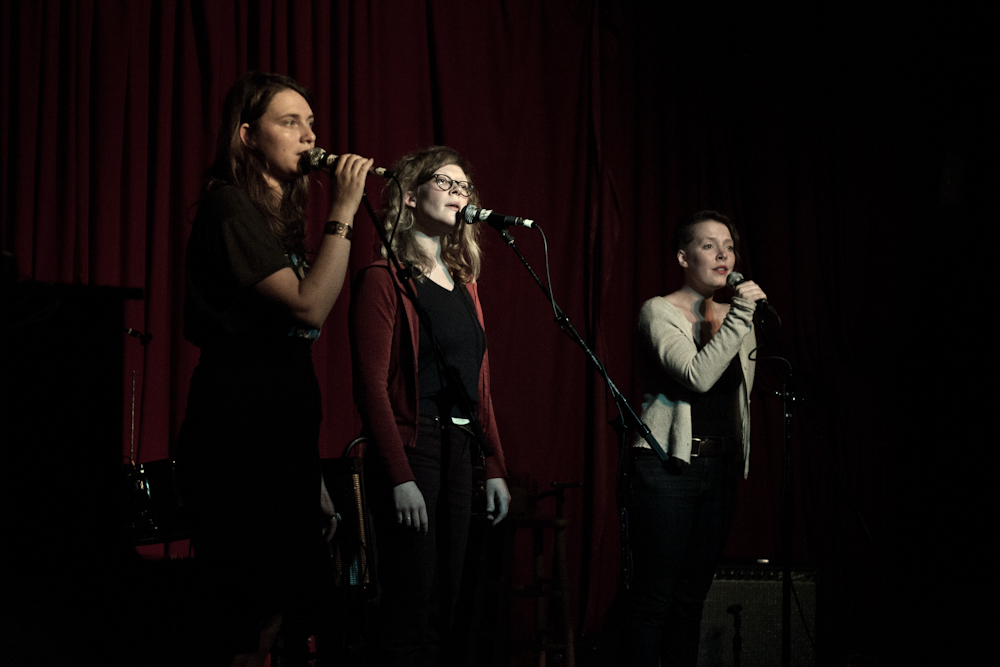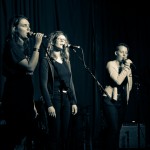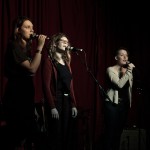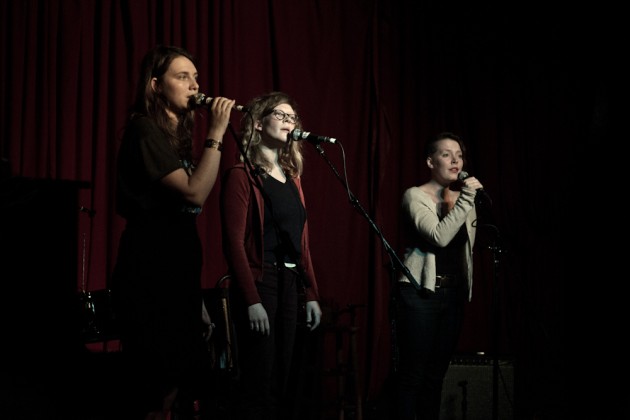
“Want to get a drink?” Amelia Randall Meath asks me within thirty seconds of introductions, taking me a little off guard. Not off-guard enough to turn it down. In fact, I was just coming from happy hour and was pleased to keep the booze train running, a fact that might have made for a sloppy interview but at least helped in having a better time for us both (I hope).
This was the first time I had ever hit the bar with my interview subject, and for all the bona fide rockstars I had met, I wouldn’t have expected to be drinking with 1/3 of the Vermont-originating, highly feminine folk group Mountain Man. I don’t know if I had a preconceived notion of what Amelia should be like… Well, okay, I did. Everyone I had met from Vermont was either a hippie or hid the fact they were from Vermont well enough for me not to be aware of their origins.
But Amelia is, more or less, normal. In fact, I don’t even think she is from Vermont. But regardless, that is where the story of Mountain Man begins — the story that brings them to Los Angeles in February to perform at the Hotel Cafe, on a short break from their stint opening for The Decemberists.

“We kind of like to be flowery,” Meath admits in response to my rant about their PR bio and request for the real story of the band’s beginnings. “Literally what happened was that I was heartbroken, Molly (Erin Sarle) was not going to school for a term and we both lived in a house called Dewey. And, I heard Molly singing “Dog Song” and ran downstairs from my room and accosted her and was like ‘you wrote a song about being a woman.’ I grabbed her by the wrist, brought her up to my room, and made her sing it to me twelve times until I had memorized it. And… I was also wasted, but I learned it and I taught it to Alex (Sauser-Monnig). So later, when Molly came back to school, Alex and I went up to her room and sang her song back to her. And we got really excited.”
That excitement seems to still command the young women, enough so that it has proved contagious, both in critical circles (Meath described the internet as having a “crush” on them) and with fans. But, the reality is that despite tours with Jonsi and The Decemberists, Mountain Man are still a very small, vastly unheard band — a fact that becomes clear when the trio takes the stage at 9pm sharp.
“Dog Song” appears early in the set, and features Molly Erin Sarle on guitar, something that would prove more the exception than the norm, with most of the set performed a cappella. In fact, the ladies even closed the set without microphones, something bold to risk in a boozy L.A. nightclub, but not without its rewards. In fact, throughout the set, the crowd respected the performance enough to remain virtually silent, making my camera clicks audible (and mortifying) while surely boosting the confidence of the group with the knowledge of having a decent-sized audience’s undivided attention.

But these intimate shows (the Hotel Cafe holds 165 people) are a rarity for Mountain Man, who had previously taken the stage in Los Angeles at the Fox Theater and the Wiltern Theater, 3000 and 2000 person venues respectively. This is not something Mountain Man takes lightly, with Meath noting, “we soundcheck at 4 or 5 (pm) and then hang out at the venue, so we haven’t been exposed to a lot of the grit of being a musician. But at the same time, it is really regimented and it really exhausts you because we are chasing the fucking bus all the time.”
These tours have given the group a rare opportunity to play in front of large crowds, particularly crowds that would be receptive to their spare arrangements and delicate harmonies. But Meath adds that they prefer smaller shows and that with the larger theaters, they “try to make it the most intimate environment possible.”
“It’s an ongoing challenge, but it’s a really nice goal to have… it is nice to have a goal when you go on stage in general,” she pointed out while speaking about the night’s looming performance. “It will probably be easier because we can make eye contact here. We can sing off mic here. Actually, we sang off mic in the Wiltern and usually you can get everyone to be quieter. When you are singing a cappella music, it is so shocking to the ears in general… it’s like when you sing quietly, usually people shutup.”
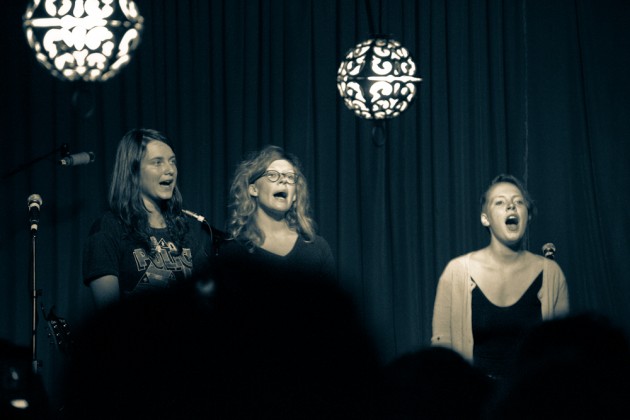
But as “shocking on the ears” quiet music can be, Meath attributes their success less to their style and more to their actual sounds.
“Our voices fit together so well, I think that is why we are getting so much attention, because something kind of magical happens when we sing together in a pretty awesome way. This is kind of why we became a unit, because it felt so good.”
And this lego-style vocal fit became an album, well, because that’s what bands do. The band put some songs on Myspace, played three or four shows, and suddenly were being offered a record deal. “Yeah, it’s pretty incredible,” Meath responds in my disbelief. “It’s totally fucking weird. It’s like the weirdest thing ever.”
And that’s one thing I gathered in my time with the singer, namely that Mountain Man is one of the least calculated musical projects I’ve been a witness to. Though it sounds far-fetched, the band is truly the result of three women, getting together, writing a few songs and suddenly being on tour with Jonsi. It is a win for bloggers everywhere who championed the album (Made The Harbor), but it is also a win for small-time recording artists who create humble works and hope that someone might pay attention. Often, these songs go unheard. But there are stories of the system, or lack of a system, working for independent musicians.
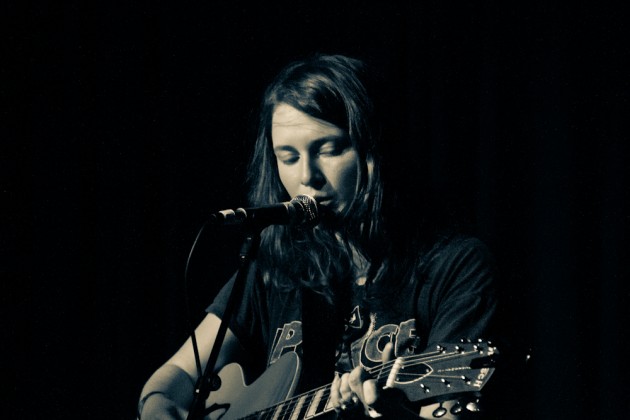
However much chance and luck come into play when discussing the success of Mountain Man, their performance at the Hotel Cafe is also a testament to raw talent. Whether it is in performing the beloved “Animal Tracks”, Meath’s solo Tom Waits cover, or the a cappella “How’m I Doin’,” the ladies exude the confidence of performers who deserve to grace any sized stage, whether it is with indie-rock giants or on their own (which they plan to do on their first headlining tour this summer). And now, the trio can turn the page on the how-we-got-here portion of their career and continue the where-are-we-going part. Chapter two should be even better.

